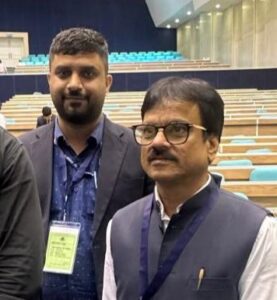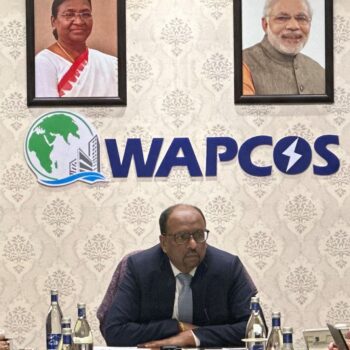NEW DELHI: The sudden fall of Rajnikant Agarwal, once the powerful chairman and managing director of WAPCOS and NPCC, has jolted India’s public sector establishment. To the untrained eye, his removal might look like another bureaucratic reshuffle. But behind the move lies a dossier so explosive that it has shaken corridors of power in Shram Shakti Bhavan and beyond.
The report—pieced together from whistleblower accounts, ministry sources and internal records—reads less like dry government paperwork and more like a thriller. It alleges that under Agarwal’s stewardship, WAPCOS, a public sector consultancy once known for exporting India’s engineering expertise abroad, became a fortress of corruption. Phantom employees, rigged contracts, benami land deals, and lavish indulgences funded by taxpayer money form the spine of what sources are calling “a parallel empire.”
Officials who have seen the dossier describe it as a chronicle of rot—an institution where corruption was not an aberration, but the operating system itself. Agarwal may have been removed, but the bigger question remains: has the system that allegedly enabled him truly been dismantled, or is this only the beginning of a far deeper reckoning?
Ghost Employees and a Tax on Public Funds
At the core of the dossier lies the “phantom payroll” scandal. Records reportedly show payments to 1,800 consultants, though only about 1,100 could be traced as legitimate employees. That gap, according to insiders, translated into a ₹4 crore monthly bleed from company accounts.
Contractors also describe a codified system of commissions: 20% on consultancy projects, 8% on construction contracts—often collected upfront. “It wasn’t a bribe,” one contractor said. “It was a tax for entry into WAPCOS’s world.”
How a State-Run Firm Funded a Family’s Lifestyle
The report accuses Agarwal of treating WAPCOS as a personal ATM. Company funds allegedly covered a ₹5 lakh monthly allowance for his son, tuition fees, domestic travel, and a fleet of leased high-end vehicles, including an Innova, MG Hector, Gloster, and two Skodas.
Foreign trips, billed as “official,” are now under scrutiny for being little more than family vacations.
Benami Plots and Blank Approvals: The Rigged Tender Machine
The alleged graft extended beyond payrolls and kickbacks. Investigators are tracking benami land deals tied to Agni Plywood in Yamunanagar. Tendering processes, meanwhile, were allegedly manipulated through coercion: junior employees forced to sign blank documents, later rubber-stamped by seniors, giving Agarwal sweeping control.
Cash Videos, Stalled Suspensions, and Ministry Leaks
Perhaps most disturbing is the picture of obstruction. A video circulating in ministry circles reportedly shows WAPCOS personnel—Amrinder Singh, Seema Sharma, Rajat Jain, and Sumir Chawla—handling cash from contractors. Yet their suspension, despite ministerial orders, was delayed by Director Pankaj Kapoor, raising suspicions of collusion.
The dossier also alleges ministry-level leaks, with sensitive files reaching Vimal Chander, described as a PR operator and brother-in-law of insider Atul Sharma. Complaints to the Central Vigilance Commission (CVC) were allegedly buried through inducements and high-level shielding.
Can Shilpa Shinde Clean House—or Will the Empire Strike Back?
In response to the scandal, Shilpa Shinde has been appointed as CMD, inheriting a company officially rated as “POOR.” Her mandate: restore governance and integrity. Yet the challenges loom large. Reports suggest that entrenched operatives—Sumir Chawla, Vimal Chander, and Atul Sharma—are already maneuvering to exert influence, allegedly offering gifts and vehicles while claiming proximity to the new chief.
The dossier leaves an open question: can Shinde dismantle a deeply rooted ecosystem of corruption, or will WAPCOS remain ensnared in its own shadows?
Will Watchdogs Act, or Is This Just Another Reshuffle?
For now, WAPCOS is at a crossroads. What was once a marquee consultancy showcasing Indian expertise abroad is now mired in allegations of fraud, intimidation, and patronage. The Agarwal episode has exposed more than one man’s alleged misdeeds—it has pulled the curtain on a culture of impunity.
The final reckoning, insiders say, will depend not only on the new leadership but also on whether ministries, watchdogs, and enforcement agencies are willing to confront the rot head-on.
Until then, the empire may be shaken, but its grip is far from broken.












